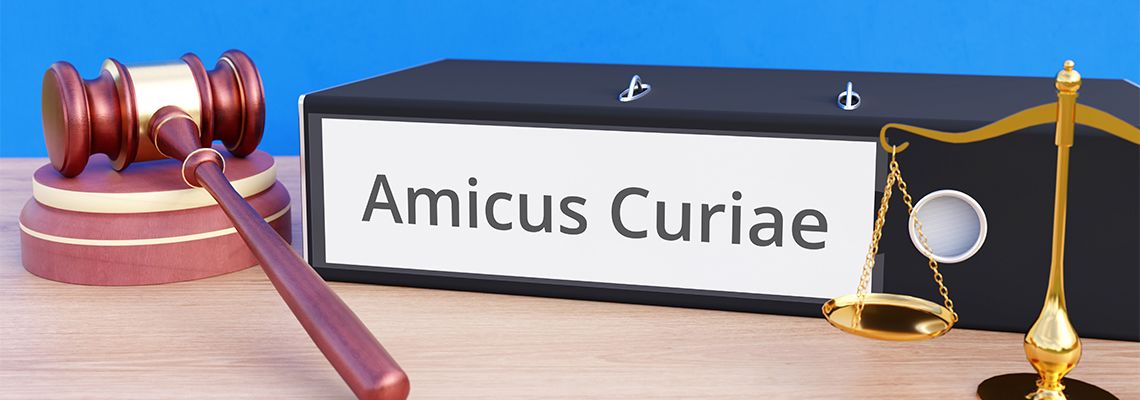
What Is the Role of Amicus Curiae in Federal Appellate Litigation?
In federal appellate litigation, the term amicus curiae, or "friend of the court," refers to a person or organization that isn't a part of the case but offers information, experience, or arguments to assist the court in making its decision.
Amicus curiae is crucial in appellate proceedings, where complicated legal issues often require broader perspectives than those presented by the parties directly involved in the case.
By filing briefs, amici can provide valuable insights on the legal, social, or policy implications of a case, helping appellate courts understand the broader impact of their decisions.
At Sigall Law Firm in Chillicothe, Ohio, I strive to help my clients understand the various aspects of federal appellate litigation, including the role of amicus curiae briefs. Here's what you need to know about the role of these briefs in federal appellate litigation.
What Is Amicus Curiae?
Amicus briefs aim to provide the court with additional information, legal arguments, or perspectives that may assist in reaching a fair and informed decision. In federal appellate courts, amicus curiae briefs are often filed by advocacy groups, trade associations, or government agencies.
These parties seek to highlight the broader implications of a decision or clarify complicated legal issues. While courts aren't required to consider these briefs, many judges find them helpful in understanding the wider impact of their rulings.
Understanding who can file an amicus curiae brief and under what circumstances is essential for appreciating its role in appellate litigation. Let’s discuss when these briefs are typically submitted.
When Are Amicus Curiae Briefs Filed?
Amicus curiae briefs are usually filed during appellate proceedings, including cases before the U.S. Court of Appeals and the Supreme Court. These briefs are often submitted after the primary parties have filed their initial briefs, this is so that the amicus brief complements rather than duplicates existing arguments.
To file an amicus brief, the submitting party must typically request the court’s permission or gain consent from both primary parties. In cases of significant public interest, courts are more likely to accept these briefs.
For instance, a trade association might file an amicus brief in a case involving regulations that affect its industry. The timing and content of an amicus curiae brief can significantly influence its impact. Let’s now examine how these briefs can affect appellate decisions.
How Do Amicus Curiae Briefs Impact Cases?
The influence of amicus curiae briefs varies depending on the case and the quality of the arguments presented. In some cases, these briefs help the court see the broader implications of a ruling, highlighting how the decision could affect industries, communities, or constitutional rights.
Judges often rely on amicus briefs to explore legal theories or policy considerations that the parties in the case may not have addressed. For example, an environmental group might provide scientific data in a case involving environmental regulations, offering context that is outside the knowledge of the litigants.
While not every amicus brief sways the court’s decision, well-crafted submissions can provide valuable context and bolster specific legal arguments. Let’s now consider the advantages and limitations of filing these briefs.
Advantages and Limitations of Amicus Curiae Briefs
Filing an amicus curiae brief can offer several benefits, but it also comes with certain challenges. Some key advantages to consider:
Broader perspectives: Amicus briefs provide the court with viewpoints that go beyond the parties’ interests, enriching the judicial process. These additional perspectives can highlight issues that might otherwise be overlooked, allowing the court to make a more informed and balanced decision.
Highlighting public interest: These briefs draw attention to the wider societal or policy implications of a decision, helping the court consider all potential consequences. This can demonstrate how a ruling might affect communities, industries, or legal precedent, potentially guiding future legal interpretations.
Supporting legal arguments: By offering additional legal analysis, amicus briefs can strengthen a party’s position or introduce new considerations. A well-reasoned brief can provide context or authority that bolsters the case's central arguments, helping the court evaluate the law more comprehensively.
Although there are several benefits to filing these briefs, there are also some disadvantages to stay aware of:
Court discretion: The court isn't obligated to review or rely on amicus briefs, limiting their potential impact in some cases. Judges may choose to ignore briefs that are deemed irrelevant or duplicative.
Resource intensive: Preparing an effective amicus brief requires time and experience, which may not be feasible for all interested parties. The costs involved can also deter smaller organizations or individuals from participating.
Potential for redundancy: Poorly drafted briefs that repeat existing arguments may be disregarded or viewed as unhelpful by the court. Redundant submissions can detract from the value that amicus briefs are intended to provide.
Understanding these factors can help parties decide whether filing an amicus brief is the right approach for their goals. Let’s now explore some common questions about this process.
Frequently Asked Questions About Amicus Curiae Briefs
Many people have questions about amicus curiae briefs and their role in federal appellate litigation. Answers to some of the most frequently asked questions include:
Who can file an amicus curiae brief?
Any individual or organization with a strong interest in the case may file, provided they gain court approval or consent from the parties.What issues can an amicus brief address?
Amicus briefs often focus on broader legal, societal, or policy implications that may not be addressed by the litigants.Are amicus curiae briefs common in appellate courts?
Yes, they're frequently used in appellate cases, particularly in matters of public interest or legal significance.How does the court evaluate these briefs?
Judges consider the relevance, quality, and originality of the arguments presented when reviewing amicus briefs.Can amicus briefs change the outcome of a case?
While their impact varies, well-crafted briefs can influence judicial reasoning or highlight important considerations.
These answers provide a clearer understanding of how amicus curiae briefs function within appellate litigation. Let’s now discuss their role in Ohio federal appellate cases.
Amicus Curiae in Ohio Federal Appellate Cases
In Ohio, amicus curiae briefs play a vital role in cases heard by the U.S. Court of Appeals for the Sixth Circuit. These briefs often come from trade groups, advocacy organizations, or government entities seeking to influence decisions that may have statewide or national implications.
Ohio-based organizations frequently submit amicus briefs in cases involving constitutional rights, business regulations, or environmental protections. By providing information specific to Ohio’s industries and communities, these briefs help the court consider the broader context of its rulings.
Filing an amicus brief in Ohio requires careful preparation and compliance with the Sixth Circuit’s procedural rules. Amicus curiae briefs are a powerful tool for shaping judicial decisions and providing courts with valuable perspectives.
Whether you’re a party to an appellate case or an interested third party, understanding the purpose and process of these briefs is essential for leveraging their potential impact.
Contact a Federal Appellate Attorney Today
As an experienced federal appellate attorney, I aim to offer guidance on appellate litigation, including the role of amicus curiae briefs, to clients in Chillicothe and throughout Ohio. Contact me at Sigall Law Firm to learn how I can assist with your legal needs in federal appellate cases.
